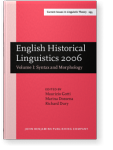On the Post-Finite Misagreement phenomenon in Late Middle English
Early Modern English shows some incidence of misagreement between a singular verb and a plural subject. A corpus of 15th century London chronicles was searched in order to investigate the origins of this phenomenon, and whether it should be handled in structural terms. It was found that misagreement almost always arose with a postfinite subject, and co-occurred in texts allowing null impersonal subjects. It is analysed as agreement with a singular expletive subject, overt or null, existing as an option alongside the option of regular number agreement. A preverbal subject contained no expletive element, hence number agreement was regular. The structural position of the postverbal subject was found to be irrelevant: three postfinite subject configurations were identified, in all of which agreement was optional. It is further noted that an increase in the phenomenon occurred during the 15th century for which a dialect contact explanation is proposed.
Cited by (1)
Cited by one other publication
DE HAAS, NYNKE & ANS VAN KEMENADE
2015.
The origin of the Northern Subject Rule: subject positions and verbal morphosyntax in older English.
English Language and Linguistics 19:1
► pp. 49 ff.

This list is based on CrossRef data as of 11 july 2024. Please note that it may not be complete. Sources presented here have been supplied by the respective publishers.
Any errors therein should be reported to them.
